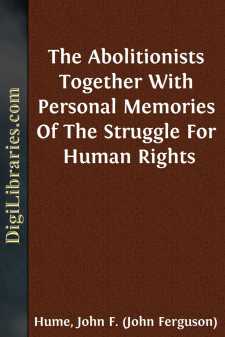Categories
- Antiques & Collectibles 13
- Architecture 36
- Art 48
- Bibles 22
- Biography & Autobiography 813
- Body, Mind & Spirit 142
- Business & Economics 28
- Children's Books 15
- Children's Fiction 12
- Computers 4
- Cooking 94
- Crafts & Hobbies 4
- Drama 346
- Education 46
- Family & Relationships 57
- Fiction 11828
- Games 19
- Gardening 17
- Health & Fitness 34
- History 1377
- House & Home 1
- Humor 147
- Juvenile Fiction 1873
- Juvenile Nonfiction 202
- Language Arts & Disciplines 88
- Law 16
- Literary Collections 686
- Literary Criticism 179
- Mathematics 13
- Medical 41
- Music 40
- Nature 179
- Non-Classifiable 1768
- Performing Arts 7
- Periodicals 1453
- Philosophy 64
- Photography 2
- Poetry 896
- Political Science 203
- Psychology 42
- Reference 154
- Religion 513
- Science 126
- Self-Help 84
- Social Science 81
- Sports & Recreation 34
- Study Aids 3
- Technology & Engineering 59
- Transportation 23
- Travel 463
- True Crime 29
The Abolitionists Together With Personal Memories Of The Struggle For Human Rights
Categories:
Description:
Excerpt
CHAPTER I
THEODORE ROOSEVELT AND THE ABOLITIONISTS
The following is an extract from Theodore Roosevelt's biography of Thomas H. Benton in Houghton, Mifflin, & Co.'s American Statesmen Series, published in 1887:
"Owing to a variety of causes, the Abolitionists have received an immense amount of hysterical praise which they do not deserve, and have been credited with deeds done by other men whom, in reality, they hampered and opposed rather than aided. After 1840, the professed Abolitionists formed a small and comparatively unimportant portion of the forces that were working towards the restriction and ultimate destruction of slavery; and much of what they did was positively harmful to the cause for which they were fighting. Those of their number who considered the Constitution as a league with death and hell, and who, therefore, advocated a dissolution of the Union, acted as rationally as would anti-polygamists nowadays if, to show their disapproval of Mormonism, they should advocate that Utah should be allowed to form a separate nation. The only hope of ultimately suppressing slavery lay in the preservation of the Union, and every Abolitionist who argued or signed a petition for the dissolution was doing as much to perpetuate the evil he complained of, as if he had been a slaveholder. The Liberty party, in running Birney, simply committed a political crime, evil in almost all its consequences. They in no sense paved the way for the Republican party, or helped forward the Anti-Slavery cause, or hurt the existing organizations. Their effect on the Democracy was nil; and all they were able to accomplish with the Whigs was to make them put forward for the ensuing election a slaveholder from Louisiana, with whom they were successful. Such were the remote results of their conduct; the immediate evils they produced have already been alluded to. They bore considerable resemblance—except that after all they really did have a principle to contend for—to the political Prohibitionists of the present day, who go into the third party organization, and are, not even excepting the saloon-keepers themselves, the most efficient allies on whom intemperance and the liquor traffic can count.
"Anti-Slavery men like Giddings, who supported Clay, were doing a thousandfold more effective work for the cause they had at heart than all the voters who supported Birney; or, to speak more accurately, they were doing all they could to advance the cause, while the others were doing all they could to hold it back. Lincoln in 1860 occupied more nearly the ground held by Clay than that held by Birney; and the men who supported the latter in 1844 were the prototypes of those who worked to oppose Lincoln in 1860, and only worked less hard because they had less chance. The ultra Abolitionists discarded expediency, and claimed to act for abstract right on principle, no matter what the results might be; in consequence they accomplished very little, and that as much for harm as for good, until they ate their words, and went counter to their previous course, thereby acknowledging it to be bad, and supported in the Republican party the men and principles they had so fiercely condemned....


